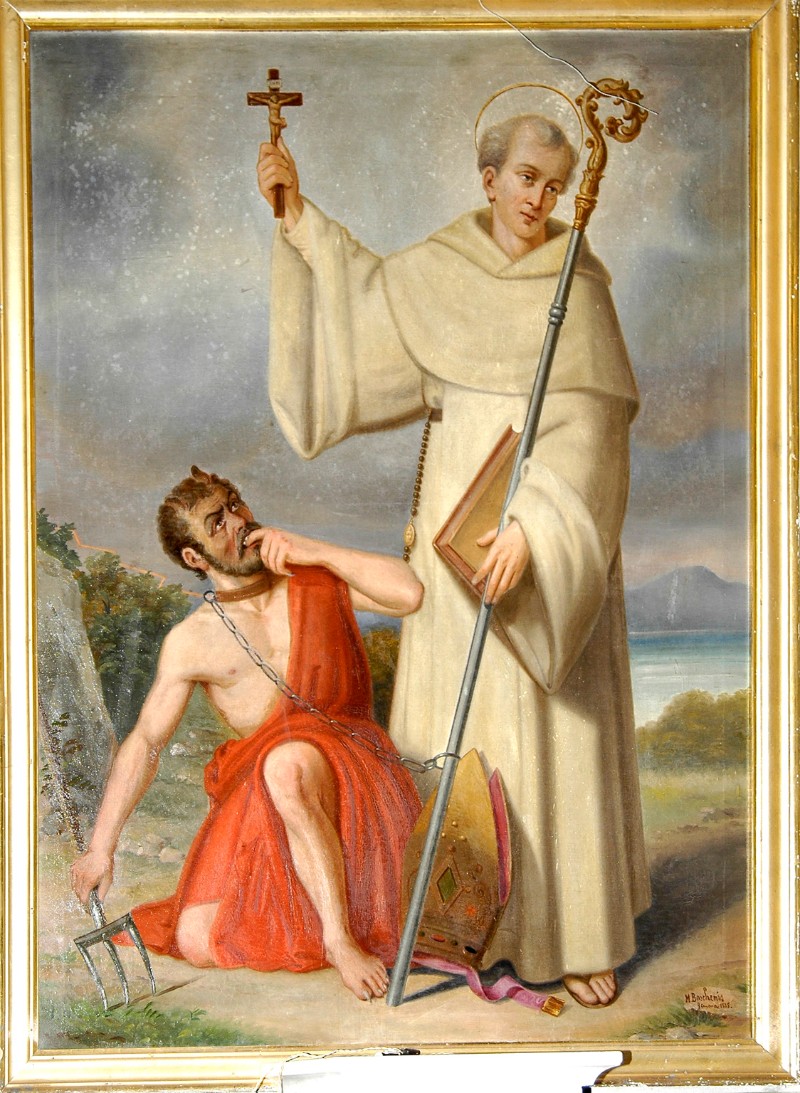
Catholic Saints
Saint Bernard of Clairvaux (1090–1153 AD), a French Cistercian monk, abbot, and mystic, emerged as one of the most influential figures of the twelfth-century Church, blending profound spirituality with dynamic leadership in an age of religious renewal and political upheaval. Born into Burgundian nobility, he joined the fledgling Cistercian Order in 1112, soon founding Clairvaux Abbey, which under his guidance became a powerhouse of monastic reform and spiritual vigor. A Doctor of the Church, Bernard is renowned for his Sermons on the Song of Songs, a masterpiece of mystical theology that explores divine love, and for his role in promoting the Second Crusade, rallying Europe with his eloquent preaching. His writings—letters, treatises like On Loving God, and hymns—shaped medieval devotion, while his counsel to popes and kings, including resolving the papal schism of 1130, showcased his authority. Known as the “Mellifluous Doctor” for his honeyed words, his feast day is celebrated on August 20, and he was named a Doctor of the Church in 1830 by Pope Pius VIII, leaving a legacy as a mystic, reformer, and voice of Christendom’s conscience.
His feast day is celebrated on August 20.
Doctor of the Church
Born in 1090 AD in Burgundy, Saint Bernard of Clairvaux rose as a Cistercian abbot, shaping medieval Christianity with mystical eloquence and reformist zeal.
Bernard was born in 1090 AD at Château de Fontaine-lès-Dijon in Burgundy, France, the third son of a noble family. His father, Tescelin le Roux, was a knight, and his mother, Aleth, a pious woman of deep faith, raised him in a milieu of chivalry and devotion. Educated at Châtillon-sur-Seine, he mastered Latin and excelled in rhetoric, showing early signs of his future eloquence.
In 1111, at age 22, Bernard’s life shifted after his mother’s death, prompting a spiritual awakening. Rejecting a secular career, he joined the Cistercian Order at Cîteaux in 1112, bringing 30 relatives and friends with him—a testament to his charisma. This Burgundian upbringing, amid feudal tensions and monastic revival, shaped his blend of noble vigor and ascetic calling.
In 1115, Bernard was sent by Abbot Stephen Harding to found Clairvaux Abbey in a remote valley near Bar-sur-Aube. At 25, he became abbot, transforming a struggling outpost into a thriving center of Cistercian life, emphasizing simplicity, manual labor, and contemplation. Under his leadership, Clairvaux grew, spawning dozens of daughter houses across Europe.
His ascetic rigor—fasting to near collapse—earned him reverence, though he later moderated it for health. Bernard’s charisma and preaching drew crowds, expanding the Cistercian Order’s influence. His role as abbot honed his spiritual vision, blending strict discipline with a tender mysticism that would define his legacy as a monastic reformer.
In 1146, Pope Eugene III, a former Cistercian under Bernard, tasked him with preaching the Second Crusade. Bernard’s fiery sermons—delivered across France and Germany—rallied nobles and kings, including Louis VII and Conrad III, though the crusade’s failure in 1148 tarnished his reputation. His zeal reflected a belief in defending Christendom, tempered by regret over its outcome.
Bernard also resolved the papal schism of 1130, supporting Innocent II over Anacletus II, traveling to negotiate with kings and clergy. His mediation in disputes—like the Milan rebellion (1145)—and counsel to Eugene III showcased his diplomatic skill, making him a pivotal peacemaker in a fractious medieval Church and society.
Bernard’s Sermons on the Song of Songs (1135–1153), 86 homilies on Solomon’s love poem, stand as his mystical masterpiece, interpreting it as an allegory of Christ’s love for the soul. His On Loving God (c. 1126) outlines stages of divine affection, from self-love to pure love of God, a framework that shaped medieval spirituality.
His lyrical prose—earning him the “Mellifluous Doctor” title—blends emotion and theology, influencing mystics like Teresa of Ávila. Bernard’s devotion to Mary, seen in hymns like O Sacred Head, enriched liturgy, while his focus on love as the soul’s ascent to God offered a tender counterpoint to his public rigor.
Bernard’s De Consideratione (1149–1153), written for Pope Eugene III, critiques papal pomp and urges spiritual focus, reflecting his reformist bent. His letters—over 500—addressed clergy, monarchs, and heretics like Peter Abelard, whom he opposed at the Council of Sens (1140), defending orthodoxy with rhetorical force.
His influence bolstered Cistercian austerity against Cluniac luxury, shaping monastic renewal. Named a Doctor of the Church in 1830 by Pope Pius VIII, Bernard’s reformist voice—sharp yet pastoral—guided the Church through schism, heresy, and moral drift, leaving a lasting imprint on medieval Christianity’s conscience.
Bernard died on August 20, 1153, at Clairvaux, aged 63, and was buried there, his relics later enshrined after floods damaged the original site. Canonized in 1174 by Pope Alexander III, his feast day, August 20, honors a life of mystic fervor and reform. His death came amid exhaustion from decades of preaching and travel.
Saint Bernard of Clairvaux’s legacy spans mysticism, reform, and leadership. His Sermons inspired devotional writers, his Cistercian model shaped monasticism, and his crusade legacy, though mixed, marked his era. Revered as the “Mellifluous Doctor,” his blend of love and authority endures, a guiding light for faith and renewal in Christian history.
“The measure of love is to love without measure.”
Born in Burgundy.
Born to noble family.
Joined Cîteaux.
Entered Cistercian Order.
Founded Clairvaux.
Led Clairvaux Abbey.
Preached crusade.
Promoted Second Crusade.
Died at Clairvaux.
Named Doctor of the Church in 1830.

“The measure of love is to love without measure.”
Saint Bernard of Clairvaux Quotes
“Love is its own reward; it seeks no other satisfaction than itself.”
“The Bridegroom seeks a bride who loves Him alone, not the gifts He gives.”
“Humility is the mother of all virtues, for it opens the heart to grace.”
“Mary is the star of the sea, guiding us through the storms to her Son.”
“The Church is a garden, and Christ the gardener who tends its every flower.”
“To serve God is to reign, for His yoke is sweet and His burden light.”